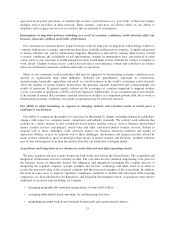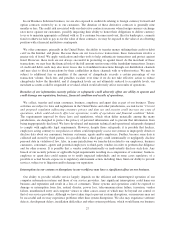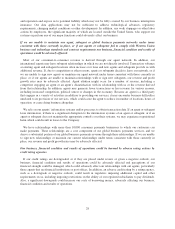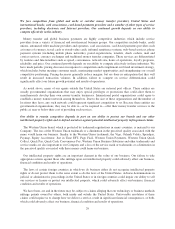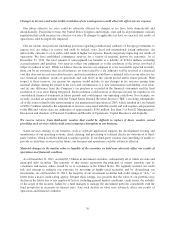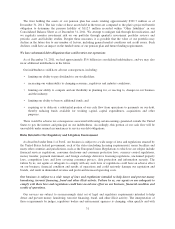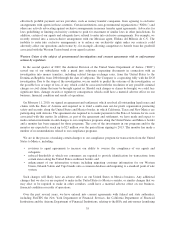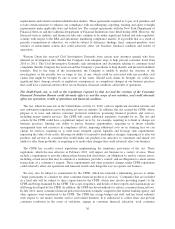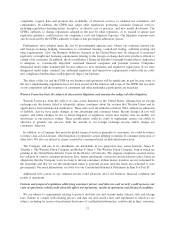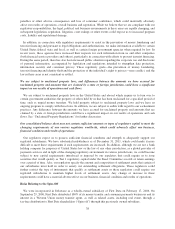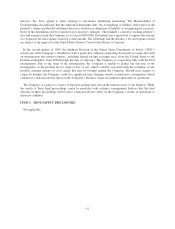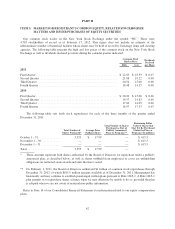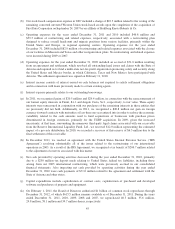Western Union 2011 Annual Report Download - page 42
Download and view the complete annual report
Please find page 42 of the 2011 Western Union annual report below. You can navigate through the pages in the report by either clicking on the pages listed below, or by using the keyword search tool below to find specific information within the annual report.effectively prohibit payment service providers, such as money transfer companies, from agreeing to exclusive
arrangements with agents in those countries. Certain institutions, non-governmental organizations (“NGOs”) and
others are actively advocating against exclusive arrangements in money transfer agent agreements. Advocates for
laws prohibiting or limiting exclusivity continue to push for enactment of similar laws in other jurisdictions. In
addition, certain of our agents and subagents have refused to enter into exclusive arrangements. For example, we
recently entered into a non-exclusive arrangement with our Mexican agent, Elektra del Milenio de C.V. The
inability to enter into exclusive arrangements or to enforce our exclusivity rights under our contracts could
adversely affect our operations and revenue by, for example, allowing competitors to benefit from the goodwill
associated with the Western Union brand at our agent locations.
Western Union is the subject of governmental investigations and consent agreements with or enforcement
actions by regulators.
In the second quarter of 2009, the Antitrust Division of the United States Department of Justice (“DOJ”)
served one of our subsidiaries with a grand jury subpoena requesting documents in connection with an
investigation into money transfers, including related foreign exchange rates, from the United States to the
Dominican Republic from 2004 through the date of subpoena. The Company is cooperating fully with the DOJ
investigation. Due to the stage of the investigation, we are unable to predict the outcome of the investigation, or
the possible loss or range of loss, if any, which could be associated with the resolution of any possible criminal
charges or civil claims that may be brought against us. Should such charges or claims be brought, we could face
significant fines, damage awards or regulatory consequences which could have a material adverse effect on our
business, financial condition and results of operations.
On February 11, 2010, we signed an agreement and settlement, which resolved all outstanding legal issues and
claims with the State of Arizona and required us to fund a multi-state not-for-profit organization promoting
safety and security along the United States and Mexico border, in which California, Texas and New Mexico are
participating with Arizona. The agreement also required us to make payments to the State of Arizona for its costs
associated with this matter. In addition, as part of the agreement and settlement, we have made and expect to
make certain investments in and changes to our compliance programs along the United States and Mexico border
and a monitor has been engaged for those programs. The costs of the investments in our programs and for the
monitor are expected to reach up to $23 million over the period from signing to 2013. The monitor has made a
number of recommendations related to our compliance programs.
We are in the process of making certain changes to our compliance program for transactions from the United
States to Mexico, including:
• revisions to agent agreements to increase our ability to oversee the compliance of our agents and
subagents;
• reduced thresholds at which our consumers are required to provide identification for transactions from
certain states along the United States southwest border; and
• enhancement of our information systems including migrating customer information for our Western
Union, Orlandi Valuta and Vigo brands onto a common database and migrating to a standard point of sale
system.
Such changes will likely have an adverse effect on our United States to Mexico business. Any additional
changes that we elect or are required to make in the United States to Mexico corridor, or similar changes that we
may elect or be required to make in other corridors, could have a material adverse effect on our business,
financial condition or results of operations.
Over the past several years, we have entered into consent agreements with federal and state authorities,
including FinCEN, the New York Department of Financial Services, the California Department of Financial
Institutions and the Arizona Department of Financial Institutions, relating to the BSA and anti-money laundering
35


